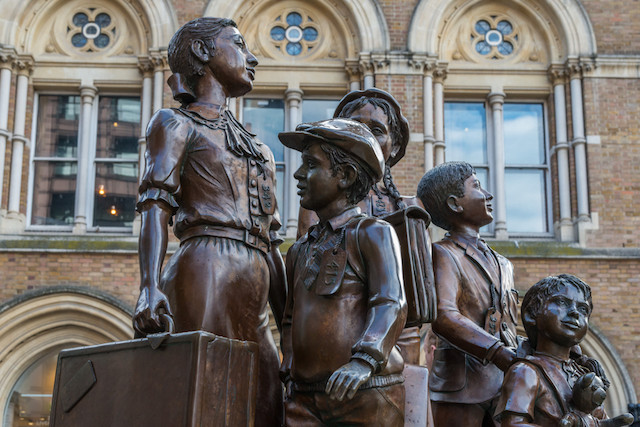Bea Green’s father was a lawyer in Munich. He had suffered early at the hands of the Nazis – he was beaten up in 1933 for daring to complain to the police about the treatment of one of his clients. They paraded him around the town with a placard round his neck saying: “I am a Jew and I will never again complain to the police.” He came home, the sound of him entering the house waking the eight-year-old Bea as she lay in bed ill, and retired to his bedroom, trying to hide the bruises and the bleeding.
Her father was allowed to carry on working after 1933, but only for Jews. He wasn’t yet trying to get out of Germany, even though his cousin and business partner had already fled to Palestine. “He was very defiant,” the 93-year-old says. “It was like stamping your foot and saying: ‘I won’t let these bastards make me go.’” His family had been in Bavaria for generations, and he was not willing to quit his homeland easily.
Phone warning
Kristallnacht, however, even he realised it was time. He was given a phone warning that the police were going to pick him up, and he fled to Luxembourg, where his sister lived, staying there for several months. Bea’s older brother Hans was training to be a brewer at a local college and when he went in on the morning after Kristallnacht, all his non-Jewish friends – who were unaware that he was Jewish – were emptying their pockets and showing off the jewellery they had plundered from Jewish stores the night before. He never returned to the college, finding his way to the UK with the aid of a Jewish organisation, to work as a cinema projectionist in Liverpool.
Thanks to a contact made by a former client who had escaped to Britain, Green’s father secured her a sponsor in the UK and a place on a Kindertransport. She boarded a train from Munich in June 1939, and recalls the warm welcome from the Dutch when it crossed the border from Germany. “They gave us orange juice and white bread and butter,” she says. “Nothing had ever tasted so good. I was completely bowled over that these non-Jewish people were nice to us. One of the little girls was crying and I remember a large Dutch lady hugging her. A Jewish girl – and the woman was not Jewish!” Six years in Nazi Germany had made such compassion from non-Jews unthinkable.
Curious link between past and present
With their children safely in the UK, her parents were desperately trying to get themselves out. The UK proved impossible, but with the help of a contact in the Peruvian embassy in Germany and a cousin in Peru, in November 1939 they were able to flee to South America, making an epic journey across the Soviet Union, China and Japan, and then going by ship to San Francisco, before heading south to Lima. Green says her mother kept a diary in which she recorded seeing the Golden Gate Bridge, built just a few years earlier, from the deck of the ship. “Today, if I visit my son in San Francisco, where he is a science professor, if I stand at the first-floor window of his house I can see the same bridge. It is such a curious link between the past and the present.”
Sanctuary
They wrote to her brother, who by then was in the British army, to say they were safe in Peru – a relief after six months of silence. But Green didn’t meet them again until 1952, after her failed first marriage. She stayed in Peru for two years and enjoyed being with her parents again, finding no difficulty picking up where they had left off 13 years earlier, but she came back to the UK, remarried and had three sons, all of whom became scientists.
Her parents stayed in Peru and lived reasonably happily. Her father even practised law again, and her mother started painting. There is one of her mother’s paintings on the wall, and it is very good. But Green points out a detail that may reveal her parents’ feelings – a beer tankard, harking back to the family’s earlier life. Lima had given them sanctuary, but it seems that part of her mother’s heart was still in Bavaria and the world they had lost.
